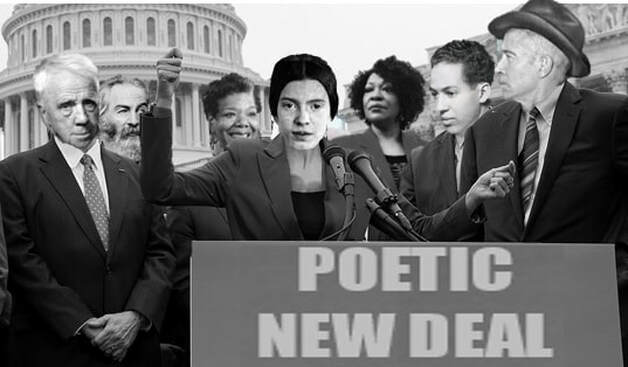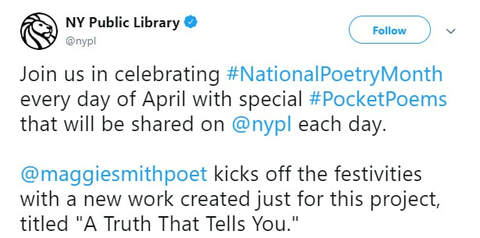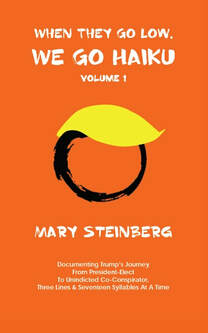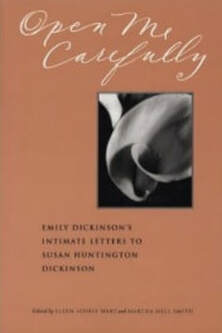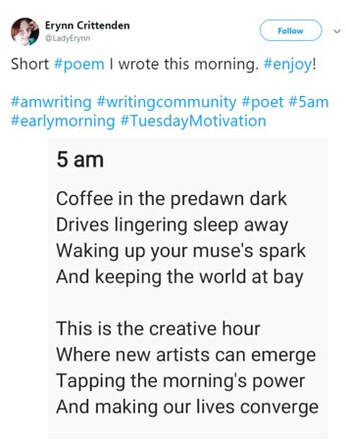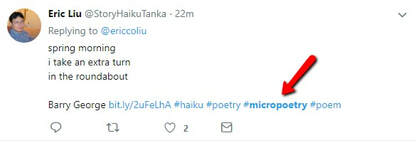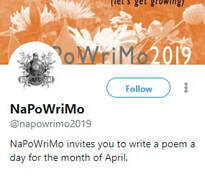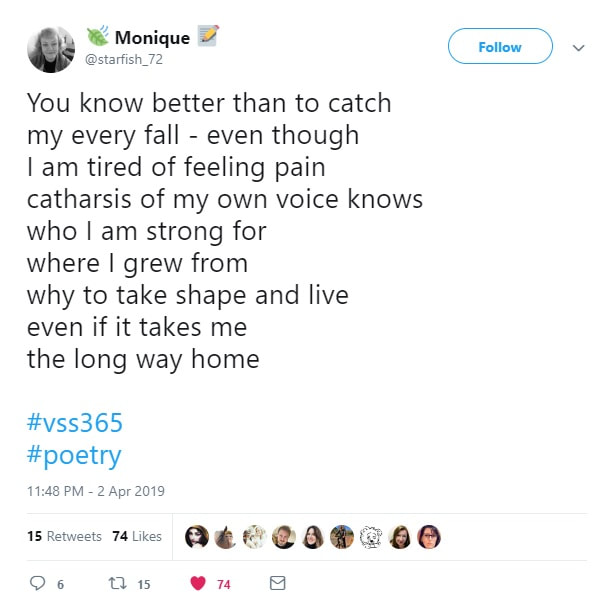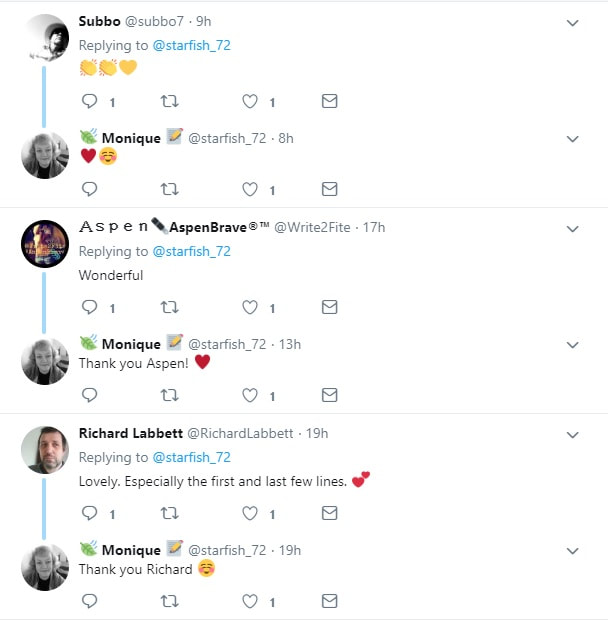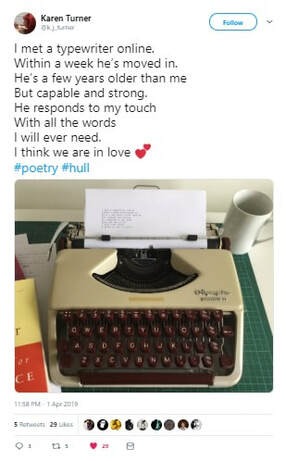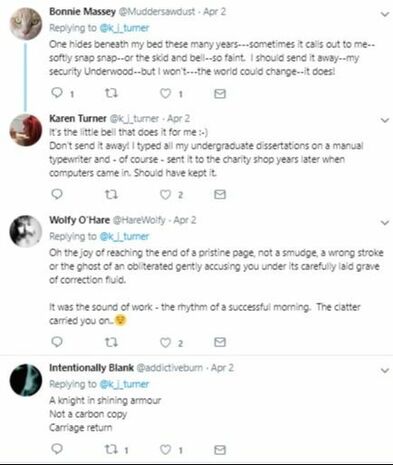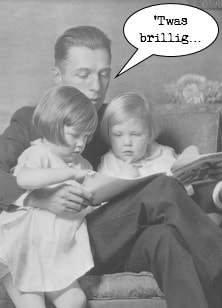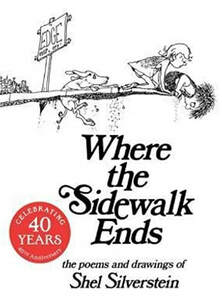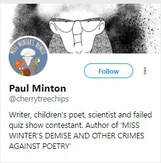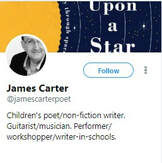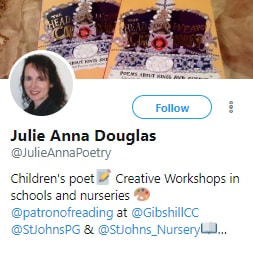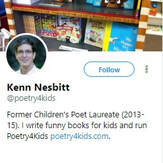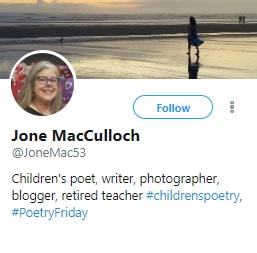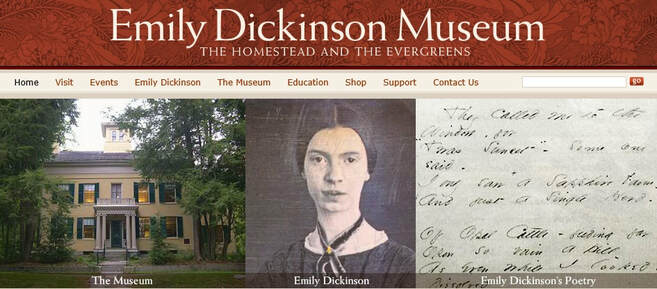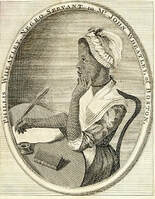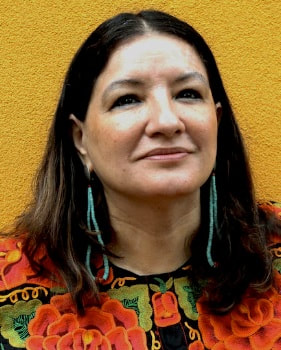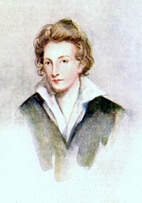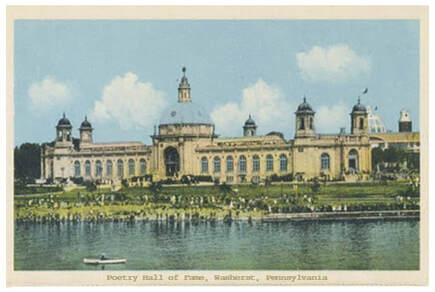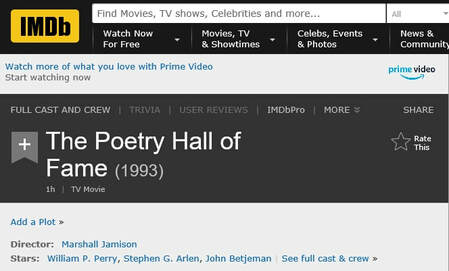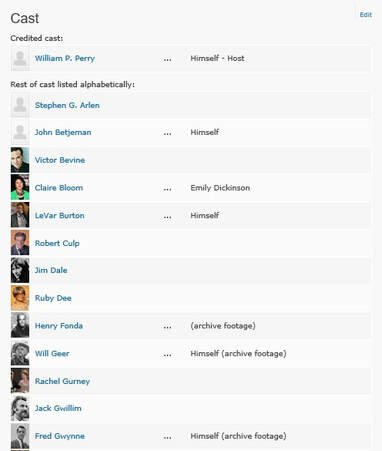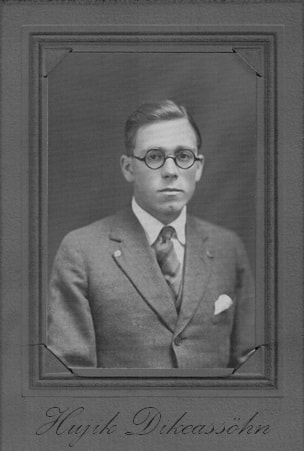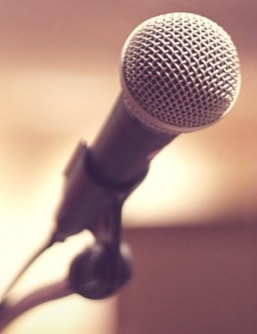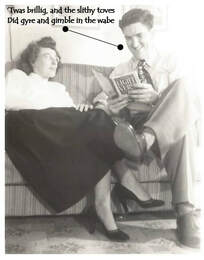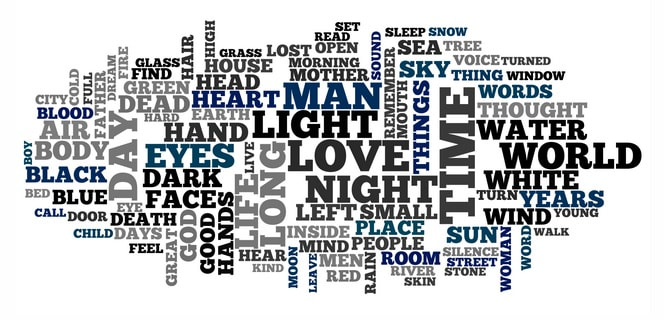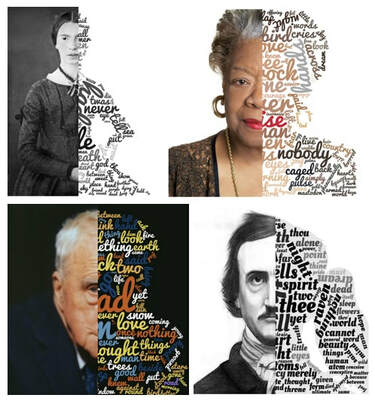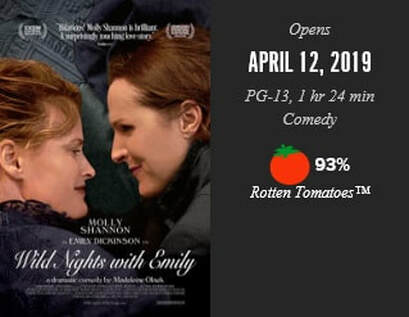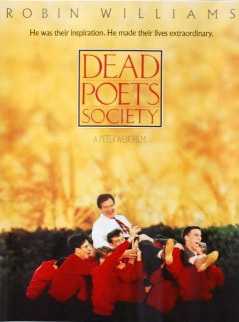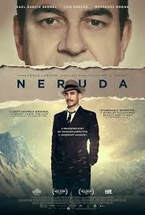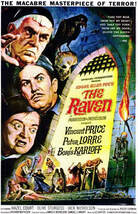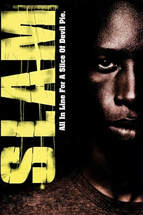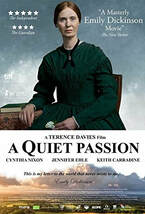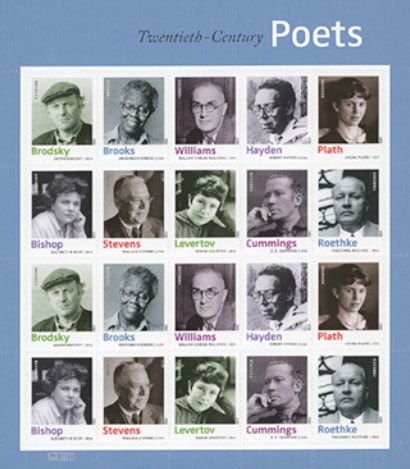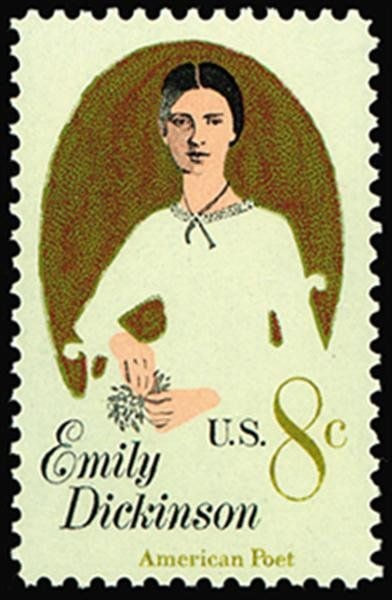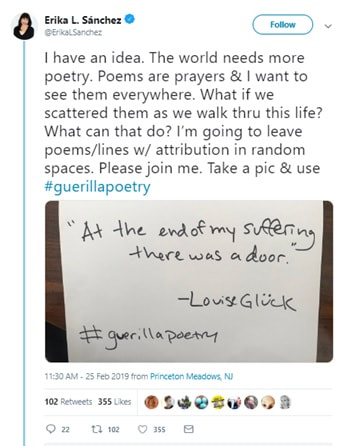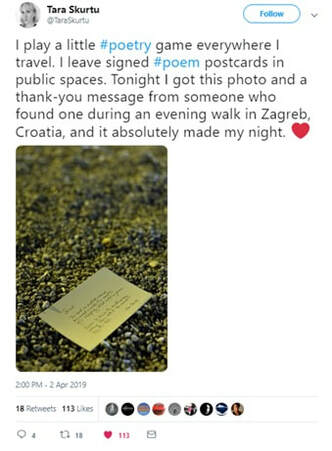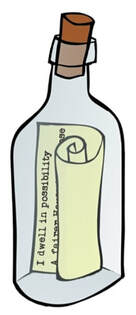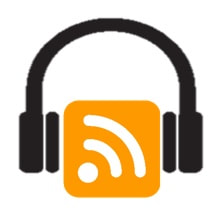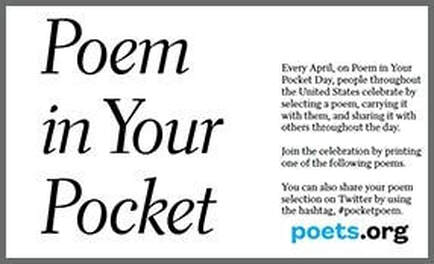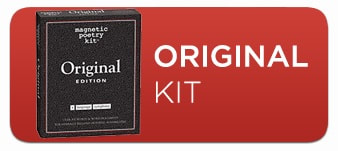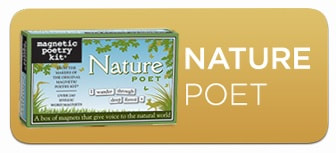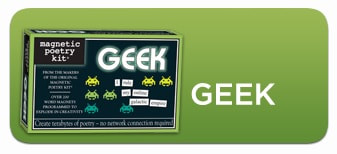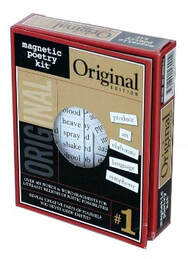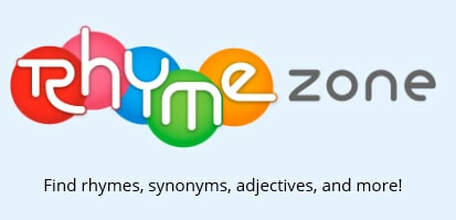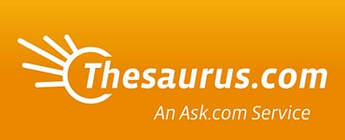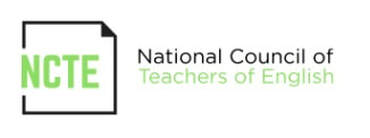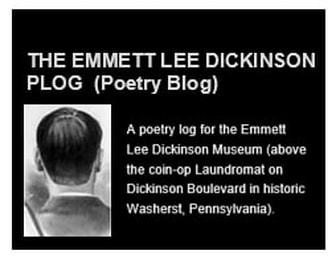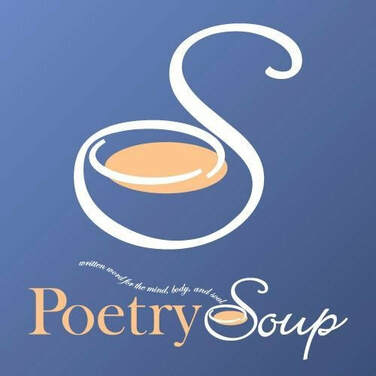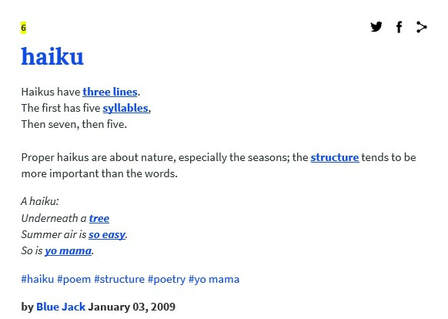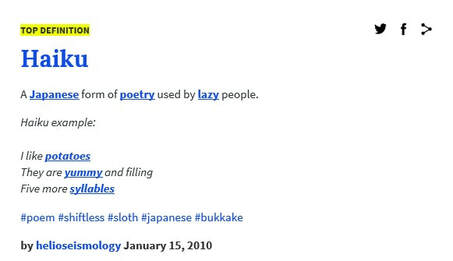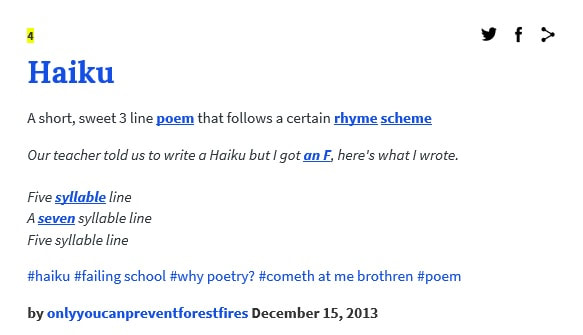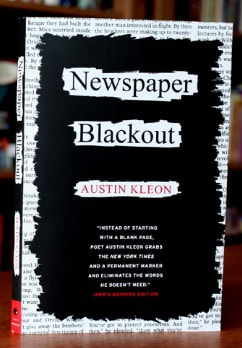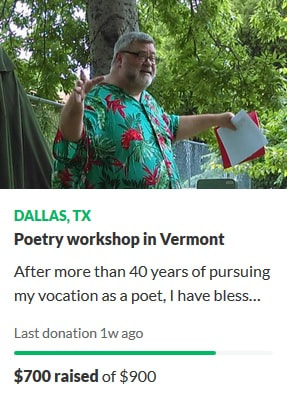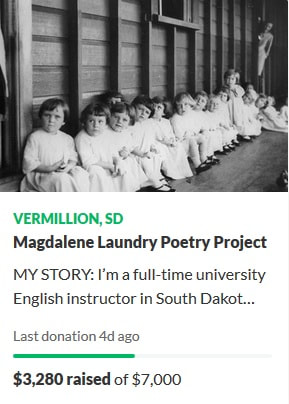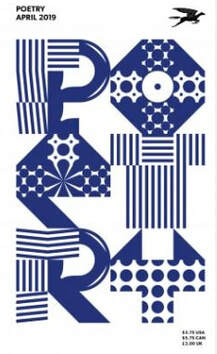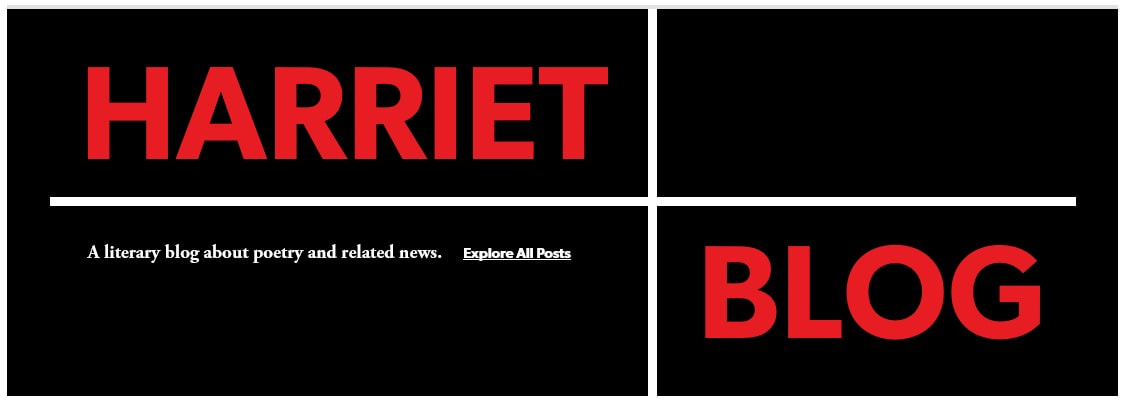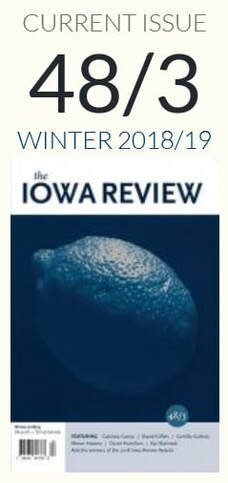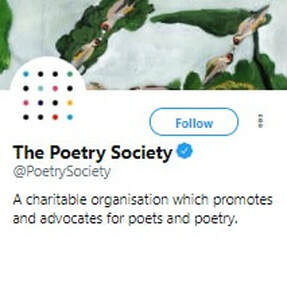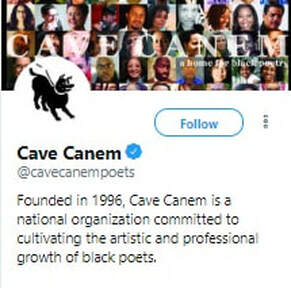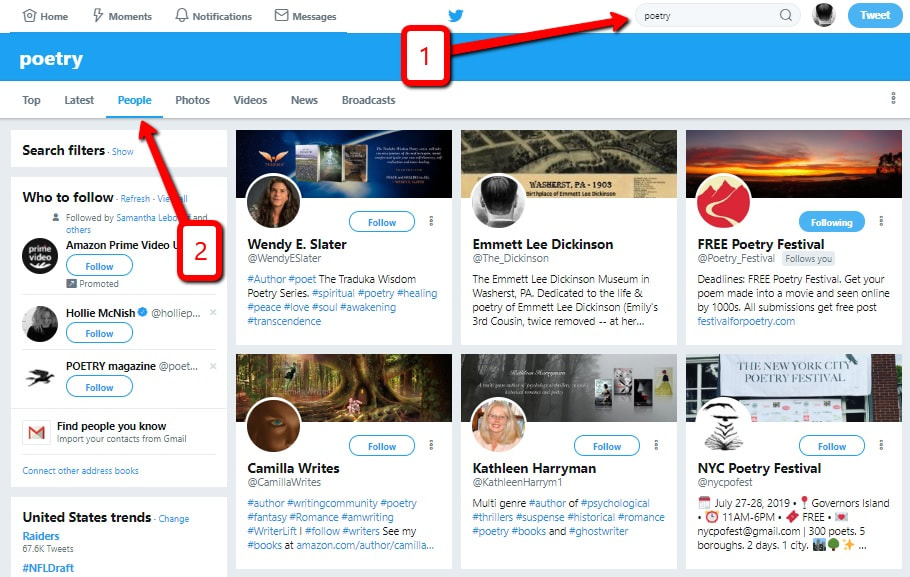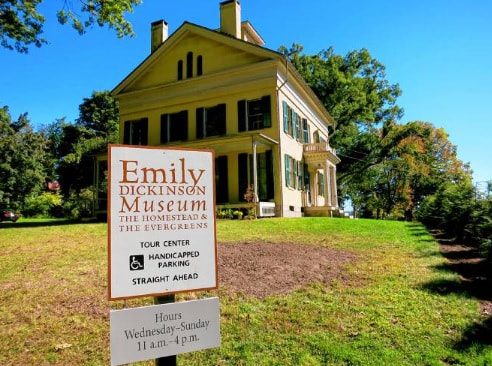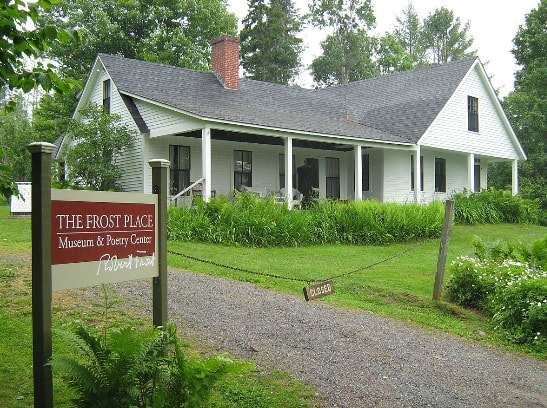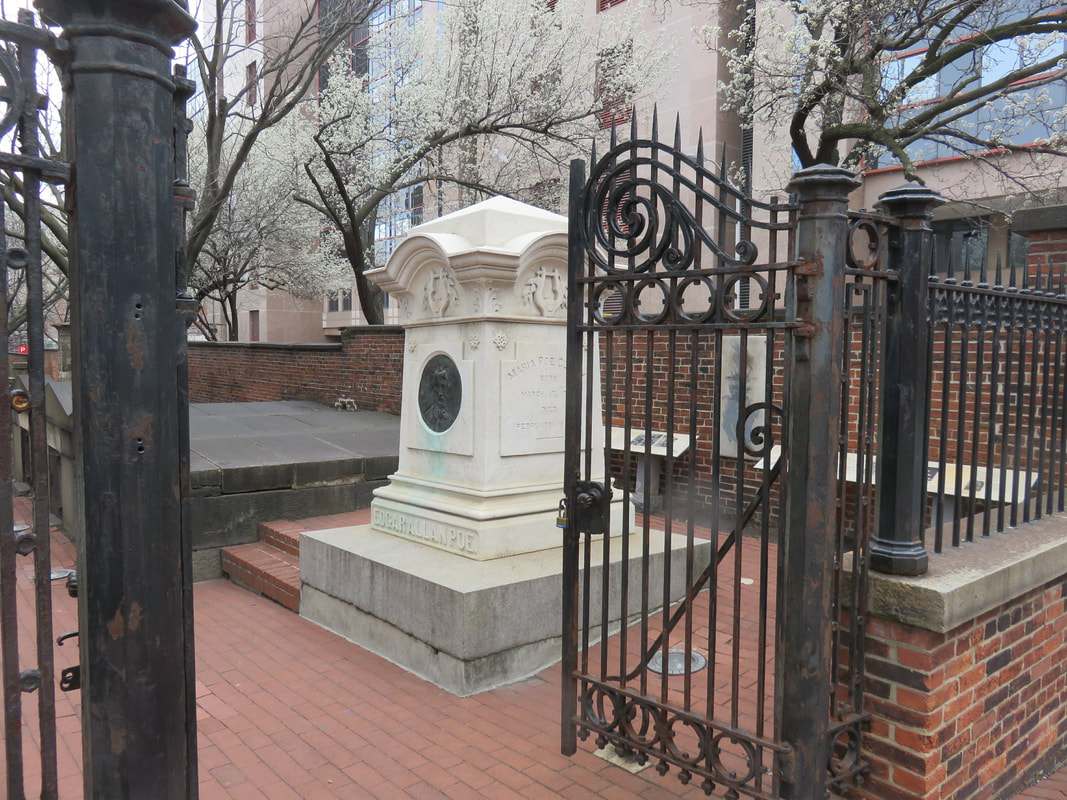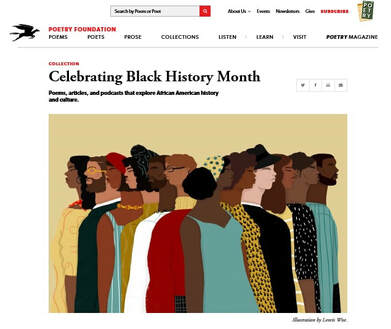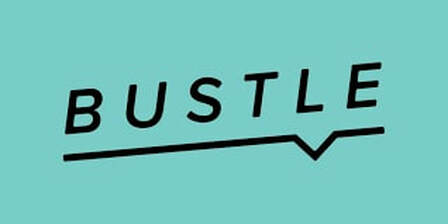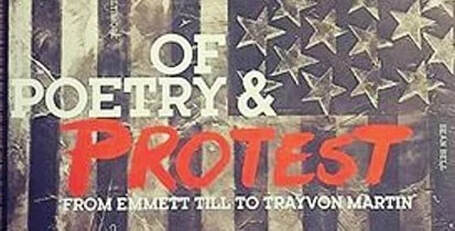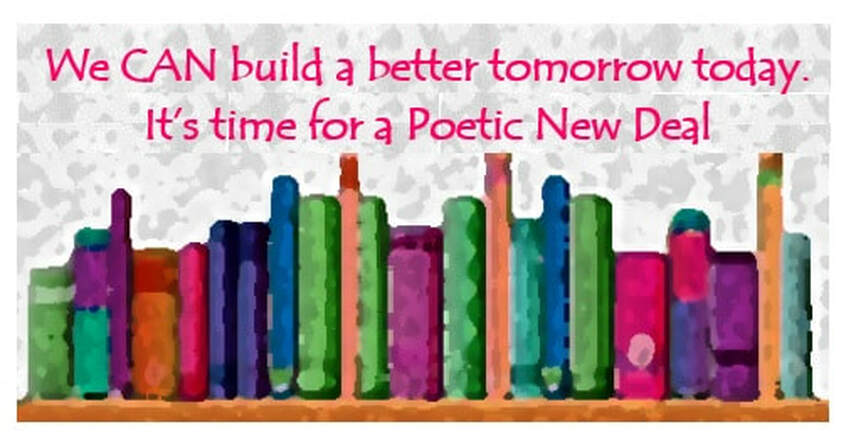National Poetry Month 2019: The time is right, the time is now for the
POETIC NEW DEAL
What is the Poetic New Deal? Click HERE for details.
What can you do throughout National Poetry Month to support the Poetic New Deal?
Read about the Poetic New Deal below. Then, when you're done, click HERE to check out Part 2.
April 1: Pocket Poems
Join the NY Public Library each day throughout the month for Pocket Poems. Check them out on Twitter -- @nypl -- or click HERE.
April 2: Buy a Book of Poetry
|
There are plenty of poetry books to choose from, but here are two we read recently that we would recommend. On the left: When They Go Low, We Go Haiku is Chicago poet Mary Steinbergs spot-on and clever look at Donald Trump's "journey from President-Elect to Unindicted Co-Conspirator three lines and seventeen syllables at a time." On the right: Open Me Carefully, edited by Dickinson scholar Martha Nell Smith, is a compilation of the intimate letters from Emily Dickinson to Susan Huntington Dickinson. From the description from Amazon.com: "For the first time, selections from Emily Dickinson's thirty-six year correspondence with her childhood friend, neighbor, and sister-in-law, Susan Huntington Dickinson, are compiled in a single volume…Gone is Emily as lonely spinster; here is Dickinson in her own words, passionate and fully alive." Other book recommendations are HERE. |
April 3: Write & Post a Poem Online
|
For National Poetry Month, don't just read poetry -- but write poetry and post it online! You can write a poem in a tweet with 280 or fewer characters (and don't forget to use the hashtag #micropoetry as @StoryHaikuTanka did below), or you can tweet a longer poem by using an attached image (as @LadyErynn did on the left).
|
April 4: Post Comments to Online Poets
Yesterday, we suggested you post a poem online during National Poetry Month. Today, we advocate reading others' poetry online (in order to do so, search any common poetry hashtag like #poem, #poetry, #micropoetry, #haiku, #haikuchallenge, etc.), and then leave positive comments, friendly feedback and/or a bit of encouragement for the poets.
Some examples: Below on the left is a poem posted by @starfish_72, and below that are just some of the comments others left for her (along with her comments back to her readers). Below on the right is a poem by @k_j_turner; and below that are comments she received from some of her readers.
It’s always nice to hear from someone who has read your work — so post a comment to a poet today. Your response lets them know that someone values their work and that they’re not just writing & posting ghost works online that go completely unnoticed.
(Of course a very easy way to validate someone’s work on Twitter is to click “retweet” or “like.” It’s as simple as that.)
Some examples: Below on the left is a poem posted by @starfish_72, and below that are just some of the comments others left for her (along with her comments back to her readers). Below on the right is a poem by @k_j_turner; and below that are comments she received from some of her readers.
It’s always nice to hear from someone who has read your work — so post a comment to a poet today. Your response lets them know that someone values their work and that they’re not just writing & posting ghost works online that go completely unnoticed.
(Of course a very easy way to validate someone’s work on Twitter is to click “retweet” or “like.” It’s as simple as that.)
April 5: Read a Poem to a Child
|
Nothing could be more joyful this National Poetry Month than to read poetry to a child -- especially if you read from Shel Siverstein's Where the Sidewalk Ends.
Of course, there are plenty of other great choices too. For a list of poems that children love -- from Poets.org --click HERE. Spoiler alert: the list does not include a single poem by Shel Silverstein. Here's another idea: check out some children's poets on Twitter. I suspect that they would have some suggestions for great children's poetry! : ) There are others too (HERE). Below: A sampling of children's poets. Click on a picture to link to the poet's Twitter feed. |
April 6: Take a Test (on Dickinson)
Are you a fan of the poetry of Dickinson? And this time we're talking Emily Dickinson -- not Emmett Lee Dickinson (Emily's third cousin, twice removed -- at her request).
If you are a fan -- and you think you know Dickinson -- then take both of our Diagnostic Internet Exams on Dickinson, self-scored tests of your knowledge of the poetry of Emily Dickinson. No cheating allowed! : )
To take the exams, click HERE for the first test -- and then click HERE for the second test.
If you are a fan -- and you think you know Dickinson -- then take both of our Diagnostic Internet Exams on Dickinson, self-scored tests of your knowledge of the poetry of Emily Dickinson. No cheating allowed! : )
To take the exams, click HERE for the first test -- and then click HERE for the second test.
Below: Of course, if you want to read about Emily, the best place to check is the Emily Dickinson Museum (click HERE), and the best place to start is with her biography (click HERE).
April 7: Read about a Poet
If you have been keeping up with our suggestions for National Poetry Month, then yesterday you read about Emily Dickinson. But what about other poets? Today we propose that you take some time this month (starting with today) to read about the life and works of other poets , particularly poets you are not familiar with -- there are plenty to go around!
We have a few recommendations below. Just click on the pictures to link to information about the poet.
We have a few recommendations below. Just click on the pictures to link to information about the poet.
Our entry yesterday also gave links to some Emily Dickinson trivia -- so here's one more trivia question related to the five poets shown above: Which one of the poets pictured above is connected to an episode of the television show "Breaking Bad"?
If you're stumped, we wrote about the connection HERE. : )
If you're stumped, we wrote about the connection HERE. : )
April 8: Visit the Poetry Hall of Fame
If you are near Washerst (pronounced "WAS-erst"), Pennsylvania, at any time during National Poetry Month, then be sure to stop by to see the Poetry Hall of Fame (below on the left). If you can't make it to the historic city of Washerst (the birthplace of Emmett Lee Dickinson, Emily Dickinson's third cousin, twice removed -- at her request), then take some time to peruse our online exhibits from the PHoF -- just click HERE.
And then there's this:
Has anyone seen the movie (?) called "The Poetry Hall of Fame"? I found this on IMDb (below left), and evidently it is some re-working of a PBS series called "Anyone for Tennyson." I also found it as a four-volume VHS set at Amazon.com -- where one reviewer said that the tapes "Managed to make 'Anyone for Tennyson' into a pretentious piece of crap."
|
At the right: The cast of "The Poetry Hall of Fame." I found it odd that Claire Bloom is listed at "Emily Dickinson," but all of the other cast members are either listed as "Himself" -- or no name is listed at all. And what a cast it is -- including Victor Bevine (who?), Jim Dale, Will Geer (achival footage), Jack Gwillium (who?), and Fred Gwynne (archival footage). There are many others -- this is just a partial list. The entire affair was hosted by William P. Perry. Who? I google-searched Mr. Perry, and a Wikipedia page about him included this information: "For three years (1976–1978) he produced a national poetry series for PBS called "Anyone for Tennyson?" starring Henry Fonda, Jack Lemmon, Claire Bloom, William Shatner, and Vincent Price. among others. Fifty programs were presented over three seasons with more than three hundred poets represented. From these programs, he later developed and produced the four-part DVD series, "The Poetry Hall of Fame,” which he also hosted." |
April 9: Participate in a Poetry Slam
|
Find a poetry slam or poetry reading in your area -- and participate! If there is no actual poetry slam, find a bar with an open mic night -- and surprise the audience with a short poem!
|
|
For more information on the history of the poetry slam, see our special exhibit on the Poetry Hall of Fame -- HERE -- and scroll down to the entry dated April 6.
April 10: Host Your Own Poetry Reading
|
If you don't want to read poetry in public (see April 9 above), then invite your family and/or some friends over and host your own poetry reading.
|
April 11: Talk Like a Poet
We have "Talk Like a Pirate Day" -- celebrated annually on September 19 -- so why not "Talk Like a Poet Day"? Well, until we get an annual day set aside to "Talk Like a Poet," why not talk like a poet for the rest on the month?
How does a poet talk? To start, you can use lots of similes, metaphors, hyperbole, personification, and other figures of speech. Of course, you can talk in iambic pentameter -- or why not give dactylic hexameter a try? And be sure to use a lion's share of poetic contractions -- like 'tis, 'twas, o'er, ne'er, e'er, e'en, and oft.
OTHER RESOURCES TO TALK LIKE A POET:
1. From RobertPeake.com, I found this article: "Having counted the occurrence of words in nearly 3,000 poems published in Poetry Magazine to create a parameterised random word generator, I am making some other interesting discoveries about these words." To read the complete article, click HERE.
2. From MyPoeticSide.com, I found this: Poetic WordClouds: These are the most common words in Poetry: "Have you ever wondered what some of the most common words used in poetry are? Of course, some poets are known for writing about certain themes, but are there any surprising words that feature throughout?" To read the complete article, click HERE.
How does a poet talk? To start, you can use lots of similes, metaphors, hyperbole, personification, and other figures of speech. Of course, you can talk in iambic pentameter -- or why not give dactylic hexameter a try? And be sure to use a lion's share of poetic contractions -- like 'tis, 'twas, o'er, ne'er, e'er, e'en, and oft.
OTHER RESOURCES TO TALK LIKE A POET:
1. From RobertPeake.com, I found this article: "Having counted the occurrence of words in nearly 3,000 poems published in Poetry Magazine to create a parameterised random word generator, I am making some other interesting discoveries about these words." To read the complete article, click HERE.
2. From MyPoeticSide.com, I found this: Poetic WordClouds: These are the most common words in Poetry: "Have you ever wondered what some of the most common words used in poetry are? Of course, some poets are known for writing about certain themes, but are there any surprising words that feature throughout?" To read the complete article, click HERE.
|
Below: A poetic word cloud of the most-used words in nearly 3,000 words -- from the article by Robert Peake (see #1 above). At the right: Word clouds for specific poets from MyPoeticSide.com, and if you check out the article (linked in #2 above), you can slide the poets' portraits over to reveal the entire word cloud. |
April 12: Watch a Movie about a Poet or Poetry
|
To celebrate National Poetry Month, why not watch a movie about a poet or about poetry? "Wild Nights with Emily" is supposedly to be released today, but it is a limited release. So limited in fact, I have absolutely no idea where it's playing. If it's playing in your area -- let me know. Currently, I'm in Chicago, and I can't find that it's playing anywhere -- so I suppose I'll have to catch it at some later date (maybe when it's available on Netflix)? Anyway, there are plenty of other poetry movies to choose from. Check out this list on IMDb, "Top 50 Poetry/Poets Movies" -- click HERE. Click any of the movie posters below and to the right to link to the IMDb page about that movie. |
April 13: Visit Your Local Library
|
Is your local library doing anything to celebrate National Poetry Month? If not, you can share these "Tips for Librarians" from Poets.org -- click HERE. Pictured at the left: If you happen to be in Chicago, be sure to visit the Poetry Library at the Poetry Foundation. Information about the library is HERE. ALSO: From TransactionsWithBeauty.com, check out "5 Poems about Libraries" -- HERE. Then try your hand at it -- write a poem about an experience at a library. |
April 14: Send a Friend a Poem
|
Here's a simple thing you can do for National Poetry Month: Buy a stamp with a poet on it (Twentieth-Century Poets are HERE), and then mail a friend a favorite poem of yours (print it out or write it out). Pictured at the left: Emily Dickinson was honored on a stamp in 1971. For a list of all individuals on US postage stamps, click HERE. Below: If you want to leave poems around for others -- above and beyond your friends -- then check out the tweets below from @ErikaSanchez and @TaraSkurtu |
April 15: Leave a Poem in a Bottle
|
Yesterday, we talked about sending friends copies of poems or even leaving poems in unexpected places for strangers to find. In a similar vein, you can leave a "Poem in a Bottle" somewhere for someone to find.
In a guest post at WritersDigest.com by Nancy Posey (from 2011), Ms. Posey wrote, "Edward Hirsch explained that finding just the right poem is like a message in a bottle. Whether in a local coffee shop or art gallery, your workplace, or classroom, join others in finding just such a poem, one that either seems to speak to you directly or one that seems to represent your message to the world, print it attractively, then roll it slightly so that it will fit in a clear bottle, facing outward, the bottle serving as a frame. Line the bottles together in a display. How you come up with a suitable empty bottle is up to you!" Ms. Posey's complete article (iwith more ideas) is HERE. Also, from the Poetry Foundation: "Curious about poetry, but don’t know where or how to begin? We’ve reprinted the first chapter from the book How to Read a Poem by Edward Hirsch. Its 16 sections provide strategies for reading poems, and each section has plenty of links to examples of poems in our archive to illustrate the points." Hirsch's first section begins, "Poems are like messages in a bottle sent out with little hope of finding a recipient. Those of us who find and read poems become their unknown addresses." The complete article from the Poetry Foundation is HERE. |
April 16: Listen to a Poetry Podcast
|
If you are a fan of podcasts, why not listen to a poetry podcast during National Poetry Month? Or, if you haven’t listened to a podcast before, then immerse yourself (or at least dip your toe) into the world of podcasting by listening to one about poetry.
A great place to start is HERE, "Top 30 Poetry Audio Podcasts & Radio You Must Subscribe and Listen to in 2019," from FeedSpot.com. I also found this article, “11 Podcasts for Poetry Lovers” (HERE), at BookRiot.com. The article, by Kate Scott, is from 2016 so there are a few issues with some of the links: |
I could not get anything but ads from the first link for “KUSP’s Poetry Show.”
Of course, you can also just conduct a Google-search on “Poetry Podcasts” and explore what you find.
Happy listening!
- The links for numbers 3, 4, 5, and 6, from the Poetry Foundation, all took me to the same location – HERE.
- Link 9 did not work for me.
- For link 10, “The Poetry Gods Project,” see Ms. Scott’s notes about how to find it.
- The link for number 11, “The Poetry Project,” take you to their website. To listen in to the audio features, click HERE.
- The links for numbers 2, 7, and 8 also worked.
Of course, you can also just conduct a Google-search on “Poetry Podcasts” and explore what you find.
Happy listening!
April 17: Listen to Poets on YouTube
If you don't have time to investigate a poetry podcast (see above), then try listening to the videos below of poets reading their own poetry. They are very short — each is just a minute or two or three. You can also check to see if your favorite poets are on YouTube -- reading their own poems or perhaps being read by someone else. Or just do a search on YouTube for "poetry readings." I found this link with over 60 videos of poets reading their poetry -- HERE.
|
|
|
|
|
|
|
|
April 18: Carry a Poem in Your Pocket
|
Poets.org sponsors "Poem in Your Pocket" annually during National Poetry Month, and in 2019, Poem in Your Pocket Day is today, April 18, 2019 -- and it's easy to participate: carry a poem in your pocket, and share it with others throughout the day. For information, click HERE. WriteShop.com provided "7 Poem in Your Pocket Day Ideas -- and Free Bookmarks": Click HERE. Finally, check out what the Emily Dickinson Museum is doing on Poem in Your Pocket Day: Click HERE. |
April 19: Write a Poem with Magnetic Poetry
|
Take some time this month -- National Poetry Month -- to create poetry with a magnetic poetry kit. And be sure to check out MagneticPoetry.com HERE. Their themed kits are HERE. If you don't have a kit handy (or if you're waiting on the kit you ordered to arrive), click on the pictures below -- this will take you to MagneticPoetry.com's online play areas -- and you can create poems right now! The site has other options too -- click HERE. |
April 20: Explore Online Poetry Resources
Take some time to explore online poetry resources this month. Three that I use quite often are RhymeZone.com, Thesaurus.com, and the Emily Dickinson Archive (be sure to check out he "and more" with RhymeZone.com -- the site has much more than just options of rhyming words).
|
If you're a teacher, check out all of the resources provided by the National Council of Teachers of English -- HERE. For more resources, Goggle-search "poetry resources." |
April 21: Read a Poetry Blog
Read a poetry blog this month! Of course, you can start with the Emmett Lee Dickinson Museum's plog (poetry blog) -- HERE. We have 600+ posts as of this date -- and more to come! If interested in Emmett Lee's third cousin Emily, try The Prowling Bee, "blogging all the poems by Emily Dickinson" -- HERE. Then check out PoetrySoup.com for a whoe host of other poetry blogs -- HERE.
April 22: Write a Haiku
Write poetry for
National Poetry Month.
Start with a haiku.
Have you written any poetry this month? If you're feeling a little too intimidated, maybe try starting with a haiku -- three lines, seventeen syllables.
Also, the history of the haiku is HERE. After reading that thoroughly, enjoy some haiku humor below from UrbanDictionary.com.
National Poetry Month.
Start with a haiku.
Have you written any poetry this month? If you're feeling a little too intimidated, maybe try starting with a haiku -- three lines, seventeen syllables.
Also, the history of the haiku is HERE. After reading that thoroughly, enjoy some haiku humor below from UrbanDictionary.com.
When you have time, also check out our plog (poetry blog) posts about haikus -- HERE.
April 23: Write a Blackout Poem
|
"The words for blackout poems are already written on the page, but it’s up to the blackout poet to bring new meaning and life to these words." This is how Blackout poems are described at Scholastic.com. "Blackout poems can be created using the pages of old books or even articles cut from yesterday’s newspaper. Using the pages of an existing text, blackout poets isolate then piece together single words or short phrases from these texts to create lyrical masterpieces." Scholastic's complete article is HERE. I also found PowerPoetry.org's "5 Tips for Creating Blackout Poetry" -- HERE -- and this article from Bustle.com that lists "Here's what to keep in mind" -- HERE. Want to know more about blackout poetry? Check out Austin Kleon's book Newspaper Blackout. Information is HERE. Of course, when you have time, be sure to check out our exhibit of blackout poems at the Emmett Lee Dickinson Museum -- HERE. |
April 24: Support a Poetry Project on "Go Fund Me"
Support a poet or poetry project during National Poetry Month. Go to GoFundMe.com and search for projects under the word "poetry." Read through a few and make a donation or two!
Three examples are below. Click on the pictures to link to their Go Fund Me requests.
Three examples are below. Click on the pictures to link to their Go Fund Me requests.
April 25: Read a Poetry Magazine
Head to your preferred book seller, check out the magazine section, and purchase a poetry magazine (or check out the current issues on their websites). Here are a few to peruse:
|
The titles listed above are just a FEW of the many poetry magazines and reviews out there. Check out the list from the Poetry Society of American -- HERE. |
April 26: Follow a Poetry Account on Twitter
Step One -- if you're not on Twitter -- is to create a Twitter account. Step Two (and Step One if you're already on Twitter) is to follow some poetry accounts on Twitter. Some examples are below (click the pictures to link to the accounts):
Below: There are plenty of toher accounts to follow. Just type in "poetry" (or "poet") into the search field, and then click on "People."
In the search field, you can also search for poetry hashtags: #poetry, #poem, #poems, #poetrycommunity, #poet, #micropoetry, #haiku, #haikuchallenge, and many others!
April 27: Visit a Poetry Landmark
If you are able, visit a poetry landmark during National Poetry Month. If you are not able to visit the actual location physically, then visit virtually by checking out the site's webpage.
Below left to right: The Emily Dickinson Museum in Dickinson's home in Amherst, MA; The Frost Place Museum and Poetry Center in Franconia, NH; Edgar Allan Poe's gravesite in Baltimore, MD. Click the photos below to link to each landmark's website.
Below left to right: The Emily Dickinson Museum in Dickinson's home in Amherst, MA; The Frost Place Museum and Poetry Center in Franconia, NH; Edgar Allan Poe's gravesite in Baltimore, MD. Click the photos below to link to each landmark's website.
April 28: Read the Poetry of Diverse Poets
|
Broaden your views this National Poetry Month by reading the works of diverse poets.
At the left: Start with poems the Poetry Foundation included in their "Celebrating Black History Month" feature. Click HERE. |
|
Then at Bustle.com, I found the following lists in their article entitled "10 Ways to Celebrate National Poetry Month This Year":
* Poetry Collections by Poets of Color -- Click HERE. * Poets Affected by the Trump Travel Ban -- Click HERE. * Feminist Poetry Collections -- Click HERE. * Protest Poets -- Click HERE. |
April 29: Buy a Friend a Book of Poetry
|
Earlier this month -- in our entry dated April 2 -- we suggested, "Buy a Book of Poetry." Well, it's time to head back to the book store. This time, buy a book of poetry for a friend (or multiple books for various friends).
In addition to the book recommendations we made above on April 2nd, you can find other ideas HERE. Also, the "Hot New Releases" at Amazon.com are HERE. |
April 30: Check Out Poetry Out Loud
Are you familiar with Poetry Out Loud? Here's information from the Poetry Out Loud site:
"Poetry Out Loud encourages students to learn about great poetry through memorization and recitation. This program helps students master public speaking skills, build self-confidence, and learn about literary history and contemporary life."
"Poetry Out Loud uses a pyramid structure that starts at the classroom level. Winners advance to a school-wide competition, then to a regional and/or state competition, and ultimately to the National Finals. Awards and placements are determined solely by the judges’ scores based on the Poetry Out Loud Evaluation Criteria."
"Poetry Out Loud encourages students to learn about great poetry through memorization and recitation. This program helps students master public speaking skills, build self-confidence, and learn about literary history and contemporary life."
"Poetry Out Loud uses a pyramid structure that starts at the classroom level. Winners advance to a school-wide competition, then to a regional and/or state competition, and ultimately to the National Finals. Awards and placements are determined solely by the judges’ scores based on the Poetry Out Loud Evaluation Criteria."
|
The finals for 2019 begin tonight, April 30: "The 2019 National Finals will be held April 30-May 1, 2019 at the Lisner Auditorium at The George Washington University. On Tuesday, April 30, 2019 the state champions will compete throughout the day in three semifinal rounds organized by region from 9:00 a.m. to 8:00 p.m. ET at Lisner Auditorium at George Washington University, 730 21st Street NW, Washington, DC. The top nine finalists (three from each semi-final round) will advance to the finals competition on Wednesday, May 1, 2019, also at Lisner Auditorium, from 7:00 to 9:15 p.m. ET." At the right: Check out the 2018 Poetry Out Loud finals on this YouTube video. You can see plenty of other Poetry Out Loud winners and recitations on YouTube -- just search "Poetry Out Loud."
|
|
Check back tomorrow for more you can do to support the Poetic New Deal.
